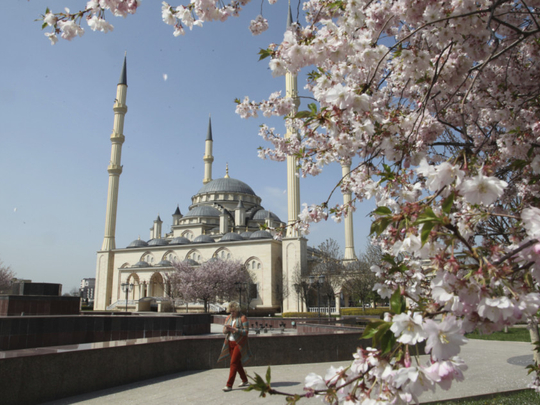
Grozny, Russia: Even during the World Cup, which brought hordes of foreigners to Russia, the capital of Chechnya remained well off the beaten path for most travelers. The Grozny airport doesn’t even have a conveyor belt for collecting baggage when pasengers arrive. Bags are lined up in a small side room instead.
Once there, though, visitors will find a unique mix of Islam and exceptional hospitality - along with signs of lingering conflicts related to the country’s civil war.
Muslims visiting from the Arab world will get a particularly warm welcome.
Grozny residents seem eager to demonstrate their connections to Islam, perhaps in part because of their relative isolation as Muslims in Russia.
An Arab journalist in town to cover Egypt’s national team encountered a taxi driver who refused to accept money because he was a “guest” at his home.
Other drivers saw their chance to practice Arabic.
“What do you like about Grozny?” one asked in perfect classical Arabic, the language used in the Quran and in literature.
It’s also taught in school, as opposed to spoken dialects used in each Arab country.
Another spoke more broken Arabic, as he confided to the journalist his bitterness that so many Chechens died in the civil war.
One young stranger was kind enough to decipher a Russian menu for the journalist, then offered him a free lift to the stadium.
Grozny has a deeply conservative Islamic character.
It’s home to one of Europe’s largest mosques.
Many men wear beards.
Women wear hijab headscarves and long dresses in line with Islam’s modest dress code.
The region’s leader, Ramzan Kadyrov, a former rebel who shifted alliances and is now backed by Moscow, is cultivating ties with Middle Eastern Muslim nations.
Like his assassinated father before him, Kadyrov, who faces charges of human rights violations including torture and forced disappearances, has overseen the reconstruction of Grozny following devastation from civil war in the 1990s.
Giant portraits of him adorn many buildings, alongside those of his father.
He categorically denies the rights charges and blames the allegations on Chechnya’s “enemies.”
He claims his rule has brought stability and prosperity to the oil-rich region.
Hundreds, maybe thousands, of Chechen militants have over the years joined the militants of Al Qaida and its successor, Daesh, in Syria, Iraq and Libya.
Their Arab peers also joined them in their ill-fated rebellion against Russian rule in the 1990s.
Militant groups maintain a foothold in Chechnya to this day, occasionally staging attacks.












